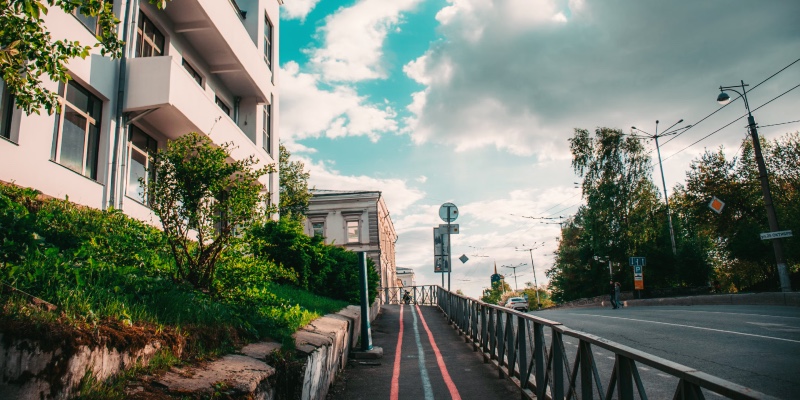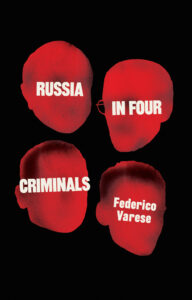When I arrived in the city of Perm in the Ural region in 1994, I went to live in a students’ hostel. It was certainly not for the first time in my life. I had lived in undergraduate rooms at the University of Bologna, where the main activities were staying up all night, smoking and organizing the next meeting of the student collective, and in Oxbridge colleges, where political discussions took place in colleges across high table seats reserved for graduate students. In the dormitory in Perm, no one talked about politics and no one seemed to spend any time sweating over books. It was a typical Soviet-style building, not far from the station: a flat-fronted white block with ten floors and a canteen near the entrance. I was one of the very few guests on my floor, even though there were a great many comings and goings of all kinds of people, some in suits, some in sports outfits, some in jeans and leather jackets. When I peeked behind the doors of the other rooms, I saw piles of goods. The student residence seemed to be a microcosm of what the country had become: a large warehouse in the post-Soviet bazaar. Everything was for sale, everyone was doing something other than their official role, everything was biznes.
Those who were supposed to live on the same floor as me simply sublet their rooms to what appeared to be a well-organized gang. After a few days I got to speak to the boss, who went by the English name of George. He was curious to meet me. He must have been in his twenties and had bristly hair, a face marked by untreated acne, and an outward bullish demeanour. Once I got to know him, he turned out to be an intelligent lad and a hard worker of humble origins. He invited me to his ‘office’ at the other end of the corridor. The scene left me stunned. On a wooden table was a calculator and several notebooks with beautifully handwritten numbers and names, while the rest of the space was occupied by dozens of boxes, the kind used for reams of paper. But there was no photo-copier: those boxes were full of money, mostly in foreign denominations.
The gang was doing pretty well, I thought, even though I did not see much security. I soon realized I wasn’t looking at the profits of a Russian mini drug cartel or prostitution racket. George and his friends traded in money, ran a rudimentary commodity exchange, and engaged in the occasional money-lending operation. At that time inflation was around 15 per cent per month. This was 1994, the year of Black Tuesday, when the value of the US dollar went from 3,081 to 3,926 roubles on 11 October: in a matter of hours some became very rich, while many were left very poor. In a few years Russians came face to face with the concepts of ‘purchasing power’ and ‘hyperinflation’. Both became a very real part of everyday life. In 1992 the young economists hired by Yeltsin to dismantle the Soviet economic system decided to liberalize prices, and the savings of Russian families immediately vaporized, generating a demand for stable currency.
George coordinated a complex network of people who had currency (especially dollars and German marks) and were looking for clients. The money often came from the banking system: corrupt officials passed on to George dollars at bargain prices, for a small fee under the table. At one time a company that sold timber on the international market urgently needed to convert $45,000 into roubles, to pay suppliers. George spent several nights on the phone to raise the funds. On other occasions the currency was provided by foreigners who were passing through and by people returning from abroad. Still others shuttled between Perm and Moscow, where they bought dollars and sold them back to George. George had to make sure that he was paid in a timely fashion, so he wouldn’t hold on to the roubles for too long. All transactions took place in cash and were based on trust; no official contract was signed.
When the news spread that an ‘English’ student had arrived, for a moment I became the centre of attention. The quid pro quo was simple: they would tell me how the nascent Russian capitalism worked, and I would give them my British pounds. In any case, George offered much better rates than the bank around the corner, which went bankrupt two months after my arrival.
‘My word is gold’, mused George, a line I imagined he’d heard on some television series or read in a Capitalism for Dummies book. I could at last observe with my own eyes the mythical (to me) ‘informal economy’. It was difficult to tell whether these trades were illegal. Legislation was constantly changing, and the boundary between what was lawful and what was not seemed to have disappeared. At the same time, those who had nothing could become very rich, the old constraints had disappeared, and the relationship between efforts and results had evaporated. George’s commerce was profitable largely because it took place in the shadow of a parasitic state, which allowed the young people’s gang in my student hall to exist.
Yet something was missing. How could George be certain that he was being paid on time? Was the word of his clients enough? And who made sure that George wasn’t robbed? As the weeks went by, I noticed some changes. At first, the rooms’ doors were refitted with reinforced iron locks. Then armed guards began stationing in the corridors. One night there was a fight outside my room.
In the meantime I had started to date a young Russian woman who was spending many nights with me. I had the feeling that it would have been better, for the safety of both, to move out and find another place; so we went to live in an apartment owned by friends. As time went by, I heard that two ‘mafias’ had taken an interest in George’s biznes. One was made up of former KGB officials and veterans of the war in Afghanistan, the other by former prisoners freshly released, who followed the traditional rules of the criminal world. I was not witnessing the spontaneous emergence of a peaceful extra-legal order free from the traps of the Soviet Union, a self-regulating free market where the best business ideas would inevitably succeed. Success was a function of access to violence, which was everywhere. Western newspapers ran headlines such as ‘The Wild East’, and Moscow was compared to 1920s’ Chicago. Trust is a great thing, but unfortunately it was in short supply. George was about to get into serious trouble. I would learn about his fate only at the end of my research trip.
The question I ask in this book is simple: has Russia ever emerged from the political and economic quandaries of the 1990s? Has there ever been a fair guarantor of people’s rights since I met George in a student hostel in provincial Russia in 1994? This is a big question. By finding an answer, we can say something important about the relationship between the rule of law and democracy, with Russia as a fitting case study. The rule of law is predicated on two principles: predictability and equality. Laws should be codified and applied equally to all people in the same situation (or at least a political system based on the rule of law must do its best to approximate this ideal). Democracy is ultimately a system of rules that strives to represent and protect all people, equally. If a class of citizens are routinely not protected, or if a person who is protected today can become the victim of the system tomorrow, then we have lawlessness and we live in a world governed by unpredictable diktats. As noted by the German philosopher Jürgen Habermas, ‘there is a conceptual relation – and not simply an historically accidental relation – between law and democracy’. Surely Russia has changed dramatically since the 1990s, and crime has declined; but has it ever been able to provide equality and predictability, hence has it ever embarked on the road to democracy?
There are several ways of venturing an answer. I decided to tackle the question by following the lives and tribulations of four characters who exemplify different moments along this trajectory. Vyacheslav Ivan’kov (chapter 1) began his criminal career in the latter part of the Khrushchev Thaw (1960s), when most of his peers spent their lives behind bars. In prison they developed a secret jargon and an initiation ritual, and their bodies were covered in tattoos. The sect to which they belonged was known as ‘thieves in law’, an expression that refers to professional criminals who follow a code of honour (‘the law’). Ivan’kov would become the most feared and the best known representative of this fraternity. His move to New York in 1992 ensured that his fame became global (he featured on the cover of Time magazine). Ivan’kov’s main activities were settling disputes among entrepreneurs who could not turn to the state, retrieving stolen goods, and dispensing a very peculiar form of justice. Gorbachev’s reforms in the 1980s had failed to equip the market economy with provisions that allow for fair exchanges to take place. A figure like Ivan’kov is what was missing from George’s business model back in Perm: a protector who ensured that nobody got robbed.
During the 1990s, many observers believed that Yeltsin was going to inject a degree of certainty and fairness into society, the state acting as an honest broker with the interest of the people at heart. Then democracy and the market would finally arrive in Russia, the argument went. Yeltsin made things worse. Privatization was for him a means of taking away resources from the ‘red’ managers and giving them to a trusted group of entrepreneurs and political supporters. He had no interest in creating an independent judiciary. Political opponents were persecuted; this process culminated in the bombing of the freely elected parliament in 1993, the adoption of an authoritarian constitution in 1994, and the Second Chechen War in 1999. A crucial ally of Yeltsin in those years was an unscrupulous entrepreneur, the most emblematic one of his generation: Boris Berezovsky (chapter 2), who began his career with a joint venture with an Italian company.
Berezovsky, before he committed suicide in 2013 in a villa in the English countryside not far from where I live today, made his fortune through scams and lies. He was no different from George’s customers back in Perm, who promised to pay and instead ran away with the money, using raw violence in the process. The supreme organ of the state, the president, instead of punishing Berezovsky, rewarded him with privileged access to the privatization of assets. The lesson was clear for all to see: every form of illegality is allowed, as long as you pay back those in power. I met him briefly in the extravagantly furnished club he had created in Moscow, the Logovaz House, where scantily clad women mingled with elderly statesmen and businesspeople. Parties started late in the evening, so it was best to get invited for a meeting after 8 p.m.
Berezovsky was instrumental in ensuring Putin’s election to the presidency in 2000, on the back of a criminal war against Chechnya (an integral part of the Russian Federation) that had been fuelled by a series of horrific terrorist attacks against ordinary Russians in 1999. Many suspect that those bombings were engineered by the very authorities supposed to protect the people. In any case, Putin won the elections and continued his predecessor’s project of crashing the democracy and ensuring that his allies controlled the economy. After he liquidated most Yeltsin-era entrepreneurs and opposition politicians, Putin began to turn on the criminal underworld. Starting in 2014, dissidents and lawbreakers who did not comply with the diktats of the prison administration were raped and tortured with impunity. We know these facts thanks to Sergei Savel’ev (chapter 3): arrested for drug dealing, Sergei was a computer expert assigned to the Saratov Prison Infirmary, where he managed the workstations of a dozen facilities. He was then given the task of downloading the torture videos and distributing them to a few trusted officials. Faced with the horror of the images he saw, he decided to copy them and, once released, he smuggled the footage into the West. The videos were published on the website of a Franco-Russian NGO in November 2021. Sergei was able to prove that the state had condoned and indeed encouraged the mass rape of convicts. I spoke to him extensively in 2021, and again in March 2022.
In the meantime Russia has become a cybercrime paradise, alongside countries such as Brazil, Nigeria, and Vietnam. The story of Nikita Kuzmin (chapter 4) shows how the Putin regime has clay feet: it must come to terms with a criminality that it does not control. Nikita Kuzmin, the inventor of the world’s most powerful computer virus, Gozi, is an emblematic personality in this secretive world. He is the adopted son of a well-known singer and was briefly jailed in the US for his crimes and retained the same lawyer as Donald Trump’s son. Russian hackers such as Nikita operate in relative autonomy, but must follow rules: they cannot attack targets within the Russian Federation and, when asked, must assist the state in its cyberwar against the West. This is why they are allowed to operate with impunity.
In the Conclusions I link the micro stories with the macro picture of the post-Soviet period. The four stories told in this book teach us that the golden age of post-Soviet democracy and rule of law was very short, if it ever really existed. Indeed, a saying I often heard in the late 1980s in the Soviet Union was ‘strike the iron while Gorbachev is here’ – a variant of ‘strike the iron while it is hot’: in other words, take advantage of freedom of speech and economic liberty before Gorbachev is removed. The end of Russia’s freedom happened much sooner than most people think. The state was never a fair enforcer of contracts. If anything, this job was done by the likes of Ivan’kov in the informal economy. The choice for the many Georges that sprung up in the 1990s was to seek either mafia protection or political protection. The criminal war in Ukraine is a direct consequence of the fear of democracy among the political elite. The West was not an innocent bystander: it trusted Yeltsin and his circle of unscrupulous men and women, allowing them to hide their money in western banks without realizing that Yeltsin was the prelude to Putin. Now we all suffer the consequences.
Towards the end of my stay in Perm I was told that, within a year, George lost everything and fell victim to a loan shark, who tortured him and chained him to a radiator for a month. He never recovered from the experience and is now cared for by his elderly parents. That nice and daring boy, whom I met in a student hostel when we were both young, is gone. He is just another victim of a god that failed.
___________________________________


















